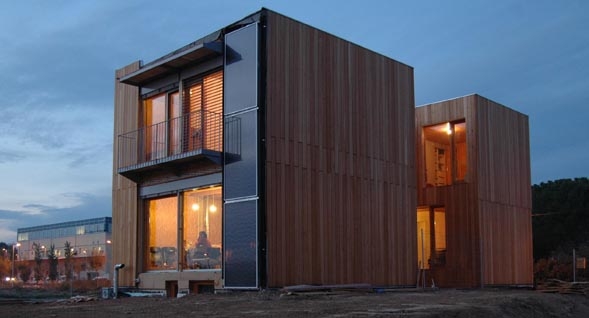When we think of a home made from wood and stone, we often imagination a classic mountain cabin. In and of itself, this association of ideas is not incorrect: in fact, the idea of the mountains conjures up an image of contact with nature.
In this sense, the use of these materials outside of the mountain context represents a return to the basics, and to a more natural dimension.
Our escape from the chaos of the city also takes place within our homes. Modern man is in search of new aesthetic and environmental balances, and finds them using ancient materials with a modern twist.
Advantages and disadvantages of wood
Nowadays, one can design and build a house made entirely of wood.
This material offers several major advantages:
- It’s earthquake-proof, thanks to its elasticity and lightness.
- It has a good resistance to fire: this might seem counter-intuitive, but the fact of the matter is that wood burns slowly, and takes a long time to lose its load bearing capacity.
- It’s sustainable: if collected in a controlled manner, it’s renewable and will be depleted. It’s recyclable and minimises pollution. It’s also an excellent thermal insulator.
- It’s inexpensive: the construction of a wood house involves extensive use of prefabricated components, thus making it easy to control production costs.
However, wood also has several disadvantages:
- The design of the house is strictly binding, and it’s difficult to make last-minute changes during construction, or to do any subsequent remodelling.
- Periodic maintenance is required in order to prevent damage caused by moisture and other deteriorating agents.
The types of stone used in the various rooms
Every type of stone has different characteristics: let’s discover the construction uses of some of Italy’s most popular types of stone!
- Tuff: this is the most widely used type of stone, both in its raw form, for a more rustic effect, as well as in its polished form.
- Basalt: this is the material of choice in the field of sustainable building. It’s a very inexpensive type of stone, since it’s quite common. It’s excellent for both indoors and outdoors.
- Marble: this material is highly prized, and is therefore rather expensive. Due to these characteristics, it’s mainly used for cladding and flooring.
Cork, wool, stone, and wood for energy savings
Did you know that these materials, in addition to being natural and eco-sustainable, also offer benefits in terms of energy savings?
Cork and sheep’s wool are materials with excellent insulating properties. When combined with natural stone walls and ceilings with wooden beams, they help to insulate your home to perfection.
With solar and photovoltaic panels installed on the roof for hot water and electricity production, one can obtain a perfectly self-sufficient home in terms of energy, with energy dispersion factor of zero.
Living in harmony with nature
Wood and stone have always been used as structural elements within buildings.
As we have seen, wood is no longer considered a “poor” material nowadays: it has become one of the main elements used in the field of natural and sustainable architecture.
Stone is also back in vogue: thanks to innovative cutting and processing techniques, stone is often used nowadays inside modern homes. It can be found in its natural form, on the walls. It can be found in processed and polished forms as cladding and flooring. It can even be found in the form of innovative and designer furnishing accessories.



